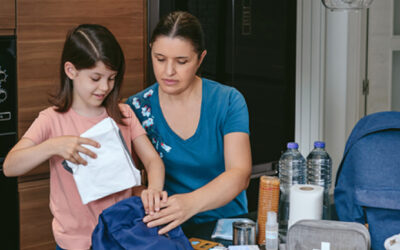In a world dominated by technology and social media, parenting preteens and teenagers has become more challenging than ever.
Nicholas George, MD, pediatrics and internal medicine physician with Our Lady of Lourdes Health, sheds light on some crucial aspects of tween and teen health. From the impact of social media to managing anxiety and the transition to adult healthcare, this ParentingU podcast packs in a lot of great insights for parents raising tweens and teens.
Parenting in the Social Media Era
Dr. George explains the importance of guiding teenagers through the digital landscape responsibly.
“Setting guidelines for social media use is crucial,” he says. “Parents need to have open conversations about appropriate online behavior.”
As parents we need to be mindful of our own screen time and cell phone use, ideally acting as good role models for our kids as we demonstrate healthy screen time habits.
“It’s hard to tell your kid not to do something if you’re doing it in front of them,” Dr. George says. He recommends parents have regular conversations with their children about how social media affects mental health.
“We’re very much socially driven. We want to hang out with our friends and do what they’re doing,” Dr. George says. “We don’t tend to post our weak moments on social media. We tend to post our happy moments.” Keeping that in mind – and even taking regular breaks from social media – can help teens cope.
Tackle Teen Anxiety
Sometimes more support is needed. In the case of anxiety, the first step is to acknowledge it.
“Many teens may be going through anxiety without knowing how to put a word to it,” Dr. George says.
Deep breathing exercises, removing oneself from stressful situations and limiting social media exposure are practical strategies that Dr. George can help teens learn and put into action to deal with their anxiety.
Getting started with counseling does require Dr. George to talk with a child’s parents. But he is intentional about those conversations as well.
“Usually, a lot more than not, when I start that conversation with a parent, they’re very much in tune with that,” he says. “We get that ball rolling and get the kids the help they need.”
Preparing for Adult Healthcare
Annual wellness visits aren’t just for young children, and Dr. George explains that parents can set the expectation for their teens to continue regular health check-ups as adults by staying on schedule during the teen years.
“During these visits we check weight, blood pressure and conduct various screenings,” he says. “These visits aren’t just about physical health. We discuss mental health, address concerns and build a personal relationship with the teen, fostering trust for future discussions.”
Around the age of 12, visits often shift to provide more autonomy during check-ups and create a comfortable space for teens to express themselves openly.
“We are more focused on giving them time in the clinic to speak with me directly, without mom or dad in the room,” Dr. George says. Teens may not feel comfortable discussing everything in front of their parents or siblings.
For children with chronic medical conditions such as asthma, Type 1 diabetes or seizure disorders, the transition discussions may begin earlier. With more responsibilities related to medication regimens, these teens are guided toward taking charge of their health sooner.
Dr. George diplomatically handles any parental concerns about leaving the room, reassuring them that while he appreciates their open relationships with their teens, this private time is crucial for fostering independence and ensuring the teens are comfortable discussing their health concerns openly.
“I want them to feel comfortable talking with a physician, whether it be me or if they move on and go to college somewhere else and find another physician somewhere else,” Dr. George says. This emphasis on comfort and openness aims to instill confidence in teens as they navigate their healthcare journey into adulthood.
A Peek Inside Those Visits
Physicians are trained to use certain tools to listen and ask questions to learn about their patients.
“You start outside of the box of how are things at home? How are you getting along with your parents siblings and other very benign questions. Then you work your way through more serious questions,” Dr. George says.
From there Dr. George works into asking about school and friends. Then more sensitive questions like “Are any of your friends doing things you don’t think are appropriate?” and “Do you have any romantic interests?”
The answers direct the follow-up conversation, including safe sex talks, appropriate dating habits and consent: no means no.
“Those are the topics that need to be spoken about with teens in that open forum with privacy,” he says. “Most adults are embarrassed to talk about some of these things, so you can only imagine a teenager who’s going through all of it and raging hormones.”
Prevention in Pediatrics Pays Off Later
“As children get older and we’re having more one-on-one conversations it’s more focused on preventive care. A lot more of pediatrics is about prevention,” Dr. George says. “My goal is to keep that prevention going through adulthood, and I think that’s the end goal of all pediatricians – set up some healthy guidelines.”
By setting up those guidelines and prioritizing annual wellness visits, the continuity of care can make adult primary care that much smoother.
“Most patients don’t realize we do a lot of screenings during those visits,” Dr. George says. “Nine times out of 10, newer patients in their late 20s or early 30s haven’t been to the doctor in almost 10 years. They usually come back when there’s a problem or health scare.”
Dr. George’s approach revolves around creating a gradual and comfortable shift for teens from pediatric to adult care. By starting the process early and customizing it based on individual health needs, our exceptional providers ensure teens are well-prepared for the increased responsibilities that come with managing their health during adolescence and beyond into adulthood.




